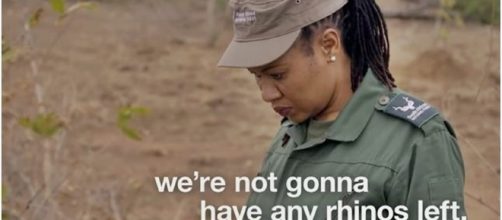Rhino horn middlemen and traders are troubled by the number of "weirdos and lunatics" who are obsessed with animal protection in South Africa. Describing the people who are desperately trying to stop the illegal poaching and Rhino trafficking in South Africa as "these weirdos," is a person of the Asian ethnic group in Johannesburg that Al Jazeera spoke to whilst filming an undercover documentary that reveals the extent of corruption in South Africa.
Al Jazeera - rhino exposé
The documentary by Al Jazeera was titled "The Poachers Pipeline," and they took a good look at the how rhino trafficking works in South Africa.
It seems that if you want to buy rhino horn - well, you can - you just need to know a middleman from the organized crime network. The man who spoke of the "weirdos" owns a Chinese restaurant in Johannesburg. Al Jazeera says that in his house he has a collection of "products from endangered species." These include ivory chopsticks, scales from endangered pangolin, and rhino horn bracelets.
Corruption at Ministerial levels
He told undercover journos that if they wanted to buy some horn, he could try and get it for them. He was able to give the journalists directions to a dealer and the trail of the trade continued from there - lion teeth, rhino horn, ivory ...all there and ready for buyers - if you know the right people.
The investigation in South Africa, Al Jazeera disclosed, included a rhino horn trafficker who "bragged about his close connections to Minister of State Security David Mahlobo, who runs the country's intelligence services." David Mahlobo denied any involvement, but when it comes to the trade in endangered animals, without corruption it would not flourish. Blasting News spoke to Alexia Trombas, founder of The Southern African Fight for Rhino (SAFFR). Asked if it was possible that corruption could extend as far as Diplomats and to Ministerial level, she told Blasting News that "corruption is well entrenched."
Asked how we can combat the corruption, Alexia feels it is so large and widespread that ultimately, the only way to save Africa's endangered species is to target grassroots.
"The only way to stop this is community involvement and a financial incentive to stop this. Self-policing run along the lines of CAMPFIRE or a similar arrangement can work. This is what SAFFR is doing going forward."
It is very hard to fight corruption at government and diplomatic levels as too many people benefit from it Alexia says, "Corrupt governments serve a purpose. They are put in power, kept in power until an international organization decides differently." She explains that it is not just at high government levels. "Corruption is found elsewhere - for example, there is corruption regarding police and the moneyed elite."
The whole of Africa is now free of colonial rule. This means that black majority rule has taken over.
African governments who allow corruption and wildlife trafficking to flourish create a mindset where it is not seen to be a problem amongst Asians where the demand is highest. According to Trombas, "the head of the Shanghai business community in SA, said that they learn everything (about the trade) from the African people themselves - so if the indigenous Africans come and offer rhino horn and ivory they see nothing wrong with buying that."
Animal protection activism is vital for rhino
The fight will go on against the exploitation of South Africa's wildlife. The rise of animal protection activism is a vital part of ensuring the long hard fight continues. "Let them call us weirdos," is Alexia's response to name-calling.
She is happy to be "troublesome" and her organization will continue to be troublesome. "This weirdo activist is the worst of them all. I will die fighting for the rhino," she concludes.
View Al Jazeera documentary here below:

